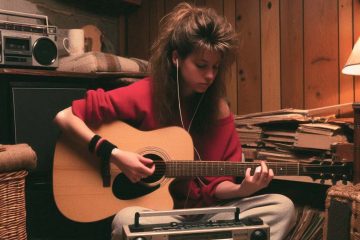(Want to improve your song writing? Take a look at my free 10-week songwriting mini-course.)
Lists of songwriting tips are great … but what I wanted to compile was a list of real game changing tips that if you action you’ll get serious results from.
This is a list of 5 “no phone in” songwriting tips. They have been lifted from videos and articles where successful songwriters talk about their process in detail. There is some real gold in here. I have tried some of them myself and they have not only made me a better songwriter but a more prolific writer. (See post script)
[Insert solemn, look into to the eyes moment] I believe if you can just do one of these tips consistently for 30 days you’ll grow massively as a songwriter.
Tip 1: Copy The Music You Love
Do you know who Stargate are? No? Maybe? They helped write some pop tunes you might know of including Beyonce’s “Irreplaceable”, Katy Perry’s “Firework” and a bunch of Rhianna songs. Whether those artists are your bag or not, this songwriting tip makes sense.
Copy music that you love. Break it down, understand how it’s put together. By doing so you start to understand how to create certain sounds. How parts interact with each other, etc. This makes it easier for you as a songwriter to find your own expression.
Think of it like taking apart an old clock and inspecting all the pieces. You see how the gears engage and mesh with each other. The delicate but important interplay of all the pieces. Rather than seeing the finished watch you see the craftsmanship and learn more of the craft.
Time well spent:
If you have a DAW and the resources, try and recreate songs you love the songwriting in. Maybe even a song you dislike but that is super popular.
The point is not to create an exact replica but by disassembling and reassembling you will better understand the craft and craftsmanship behind the song.
If you’re not a DAW producer type person, write a “song report” (like a book report) on the song. Talk about each section. Listen to all the instruments/parts. What are the drums doing in each section? What is the bass doing in the chorus and how does that support the main melody? Note all the interesting things you find that you didn’t hear at first.
Songwriting Tip 2: Co-Write
I’m leveling this one straight at myself. I haven’t co-written in a while – and I definitely should. I love creating by myself but time and time again I hear people talking about collaborating and I know it’s a great idea.
“But truthfully, I don’t think we really knew what we had when we walked out of there that day! We thought we’d just written a couple of good songs.”
Lady Antebellum’s Charles Kelley
And after a scathing 2 star review of the album in American Songwriter the group might have been right. But a Grammy in 2010 for song of the year plus album of the year is sufficient proof they had a song which resonated with people.
This isn’t a songwriting tip so much as a scenario which I hear time and time again. Finish songs, and get them out there. You never know how they will resonate.
Now an actual songwriting tip: if you haven’t co-written, you should give it a try.
Tor Erik Hermansen from Stargate is big on collaboration. He encourage songwriters to:
- Work with new people all the time to push yourself.
- Keep the songwriting atmosphere fun and don’t get bogged down.
- Work with people who have exciting ideas.
Getting into the room with people is like dating. You need to find out who you click with.
As veteran songwriters they all see the benefits in staying open to other people’s ideas. “Staying humble and open minded is the key to longevity”.
Songwriting Tip 3: Release Music Regularly
Technology has always driven the changes in the music industry. The invention of vinyl records meant selling sheet music wasn’t as popular. Streaming has meant people mostly consume music song by song rather than in the album format.
Streaming services like Spotify have adjusted their platforms to serve up songs that will keep people listening (and paying their subscriptions). For artist’s this also changes how we record and release music. However, THIS isn’t the only reason you should be releasing music regularly.
You may not have hear of Nic D but he has managed to generate a very healthy living in “the new music business” that relies on the new media channels of social to break hits. He released 84 songs before he had a hit but it’s not just about getting a hit, it’s about having more chances at discovering what resonates with your audience. Here’s an except from his book:
Would you rather have 100 at bats or one swing? What are the best odds? Putting 1 song out a month,
or even less frequently, and trying to blow it up or releasing 24-52 songs a year and getting one of
those to blow up. You have to feed it to the wolves and let them decide what’s good. Far too often people put all their energy and resources into one song. Why do that when quality is subjective?
Quality is subjective means the song you love, other people might hate, and the song you hate, other
people might love. The song you think will blow you up could completely flop and the song you don’t
even wanna release could blow you up. You get my point.
I’ve read many stories of artists and song writers who completely discounted the songs that blew up for them. Adele didn’t really think “Rolling In The Deep” would be a hit. Kenny Logins didn’t think “Footloose” would be a hit. There is a long list of songs that weren’t some ones first pick to be a hit.
The writing, recording and releasing cycle has changed but this can be a huge advantage for songwriters as you get more opportunities to put out music and get real feedback on your songs.
Songwriting Tip 4: Don’t Discount The Demo – Capture Everything
Another idea which kept cropping up in numerous interviews was the idea of demoing songs and actually capturing the final take. Capturing something special as it comes to you and demoing it could leave you with a piece of gold.
I found this while looking at songwriting interviews about Adele’s “Rolling In The Deep”
She was obviously quite fragile and very open about what had happened. But she had fire in her belly,” was how Epworth later recalled the emotionally charged day-and-a-bit it took to record the track. Adele had intended it to be just a demo, but she quickly came to realise she would struggle to recapture the “heat of the moment” emotion of that first recording. So the demo became the final track; and later one of her biggest hits worldwide; and then her first US No 1.
Interview for Adele’s album 25, New York Times
I also happened to find this interview with Max Martin recounting how the song that made the Back Street Boys a household name was a demo that Martin was reluctant to show Clive Calder of Jive records because in his words he’d forgotten about it and it was “horrible and badly done in every way”:
Time well spent:
Get your writing or studio space setup for demoing and sketching. Have a good mic patched and ready to capture the magic. This is like a landscape photographer who has their camera with them all the time and has their settings all worked out. They are ready to capture a magic moment when it happens.
Songwriting Tip Number 5: Practice Songwriting Regularly.
Malcom Gladwell’s book Outliers mentions the 10,000 hours to “master a skill” principle. The idea goes that if you want to master something you need to spend 10,000 hours doing it.
What does that look like? If you were practicing songwriting for 3 hours per day it works out to be about 3 hrs a day every day for 9 years!
Before you throw your hands up in despair, this isn’t a hard and fast rule. As Malcom Gladwell clarifies in this video, it’s a helpful metaphor when understanding the level of commitment to your craft. Even more important is to be doing the right sort of practice.
Flushing Out The Garbage
Ed Sheeran, Ryan Tedder and many other songwriters talk about spending many hours writing BUT it’s not just picking up a guitar or sitting at the piano and smashing out your 10,000 hours as the bro-science meme goes.
If you listen to Sheeran and Tedder they describe a deliberate process of working consistently to improve their songwriting with a very specific goal and an approach that grew them as songwriters. This is called deliberate practice and basically it’s the “hard stuff” that only a small percentage of people are willing to do to become masters of their craft. You can hear Sheeran talk about this in an interview he did many years ago:
“It literally came from writing a song a day or two songs a day or 5 songs a day and getting all these songs out of me. Doing a million gigs, sometimes 3 gigs a day. We did 6 gigs a day one year at Glastonbury. But I think if you view it as a dirty tap it’s going to flow shit water out for a substantial amount of time and then clean water’s going to start flowing. Now and then you’ll get a bit of shit but as long as it gets out of you it’s fine.
So with songs, you’re going to write shit songs at the beginning. You are. My songs were terrible. I listened to it the other day and it was awful. But I got it out of me and the more and more you write the more and more you experience and then you start flowing clean water and songs get better and better and better.”
You can read more about Ryan Tedders journey in this blog on why the 10,000 meme is wrong.
You are going to write bad songs, get them out of you, but keep writing and they’ll get better.
A Song Each Day?
You might think how can I write a song or two a day? In researching songwriting methods I’ve picked up the following points:
- Be purposeful and set up a space where you can write. (See the point 4)
- Moving quickly and don’t get bogged down in the minutia. If you do end up getting bogged down, work out why and try to adjust your approach to stop this happening.
- Run with the inspiration as it happens and don’t get in the road of it by over thinking. Just get the ideas down. Show it to other people before you write off a song.
- Record the session as you’re writing. It’s so easy to have a mic running the whole time in a writing session so you don’t miss a special moment of inspiration. The video below shows you how Ryan Tedder approaches crafting a hook and capturing the process so you don’t miss any gold.
Time Well Spent:
Set aside time to write. The “Shape of You” writing session was 1.5 hours and Ed went on to another 2 writing sessions afterwards.
Get up at 6am and write until 7:30am everyday if you’re a morning person. If not in the morning, set aside 8:00pm – 9:30pm and write in the evening. The ideal time is up to you, the point is to write.
Also, create an area where you can write, even if it’s a closet.
Let’s Hear Those Again
Here they are again in “write them down and stick them on the wall” format:
- Spend time deep-analysing and copying the music you love. Don’t just listen, take it apart.
- Co-write in the same room with someone. Out of your regular genre if you’re already co-writing.
- Release music. Set yourself a monthly goal of releasing at least 1 new song. Even a “live and acoustic” thing if you’re not hitting the studio regularly.
- Record your writing sessions. Demo with gusto!
- Write music regularly. Set aside a time and place, at least 3 days a week, to write for 1.5 hours.
I’m inspired, I hope you are too. Let’s rip into 2020 with a 20-20 vision (nice) to grow as songwriters and write more songs.
Post Script
In the spirit of “look what you can do if you do something consistently” here is a track I got finished recently. I made a change to my songwriting routine so I could get into the studio for 1.5 hours 4-5 days a week. By doing this I was able to write and release the song below in 2-3 weeks.
“Bring Me The West” is a royalty free spaghetti western track. I had a lot of fun writing it and learnt a lot by copying ideas from the soundtrack of The Good, The Bad and The Ugly by Ennio Moriccone. I also learnt that whistling in tune is much trickier than it would seem.
Want more songwriting tips from famous songwriters? Here’s some more posts:



0 Comments